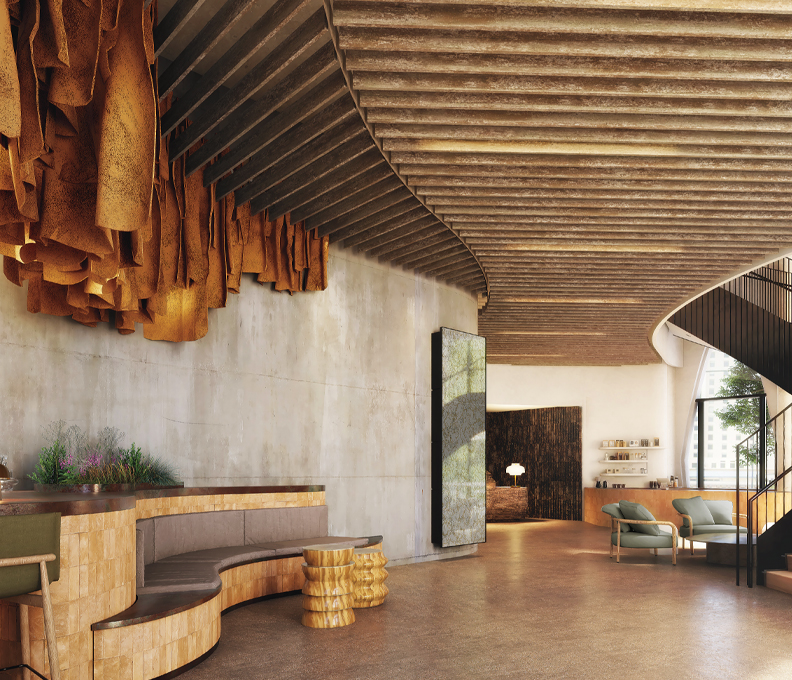LGBTQ Travelers Are Seeking More Sophisticated—and Costly—Adventures
How hotels, airlines and travel brands are embracing the LGBTQ community— and its impressive market share
by Todd Plummer
June 2, 2023
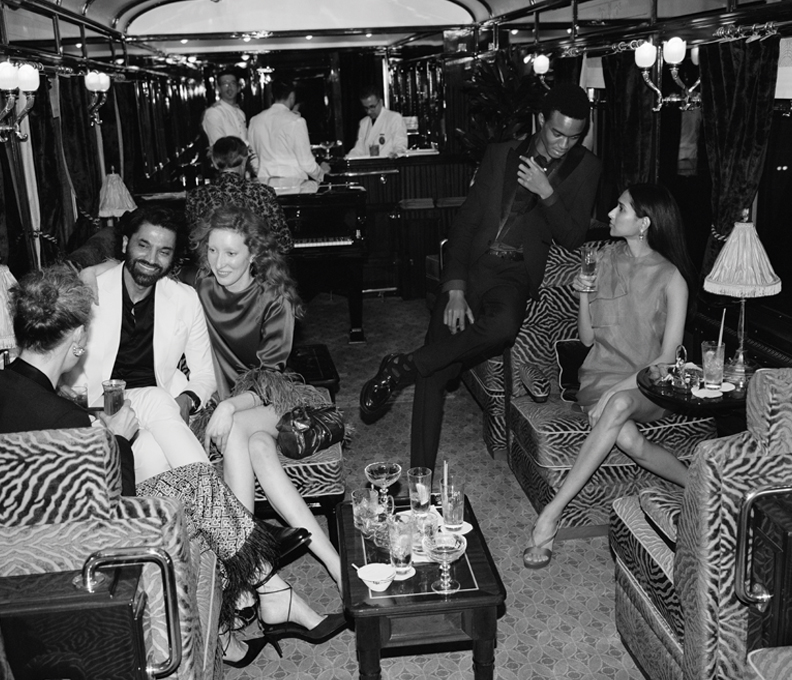
Bar car “3674” on the Venice Simplon-Orient-Express during Belmond’s Travelling With Pride event / Photo: Courtesy of © Belmond/Mark Newton
LGBTQ travel has long existed on the periphery. Just 20 years ago, in the 2003 film Under the Tuscan Sun, Diane Lane’s character Frances Mayes fortuitously ends up on a group tour of Italy with a company called Gay & Away. Her tripmates are presented as a laugh line—stereotypical characters, on an unimaginative bus tour of Tuscany’s most touristy spots, every single one of them Caucasian, and none presented with any nuance or depth. It’s an outdated representation of diversity that by today’s standards doesn’t seem diverse at all.
But times have changed. LGBTQ travel is no longer relegated to the world of uninspired bus tours. Gay travelers are seeking more sophisticated—and costly—adventures.
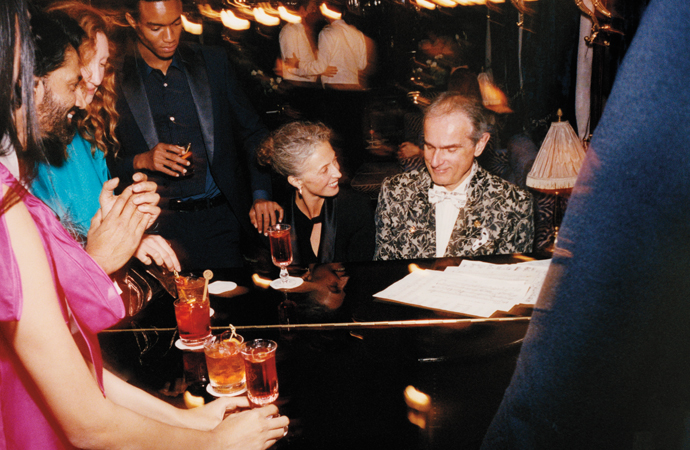
Entertainment aboard Belamond’s Venice Simplon-Orient-Express / Photo: Courtesy of © Belmond/Mark Newton
“Our LGBTQ clients are traveling for a month or more at a time, especially those who do not have children,” says David Rubin, CEO of DavidTravel, an independent affiliate of Coastline Travel Advisors, a Virtuoso agency. With so many companies operating remotely since the pandemic—plus the modern ability to manage banking, homes and pretty much everything from afar—travelers are feeling empowered to live their best lives through extended periods of away time.

Cocktails aboard Belmond’s Venice Simplon-Orient-Express/ Photo: Courtesy of © Belmond/Boby Allin
They’re going longer, and they’re going bigger. “Especially with our LGBTQ clients, we are doing lots of milestone event travel, where our clients host their guests for a core part of a celebration trip,” says Rubin. Perhaps the main event is four nights at a serviced villa in Italy or a week in Buenos Aires over New Year’s, and then all guests are free to add on their own pre- or post-celebration diversions. “Especially after being isolated and not being able to travel during the pandemic, we are seeing clients calling on us to create these great shared experiences.”
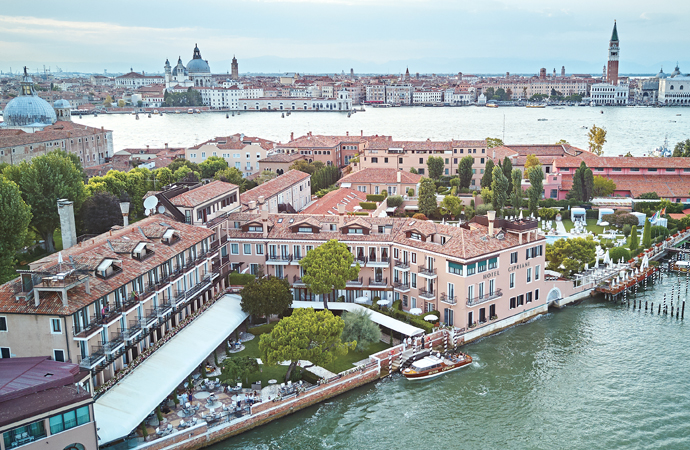
Hotel Cipriani in Venice, Italy, where guests stayed during Travelling With Pride / Photo: Courtesy of © Belmond_Tyson Sadlo
Luxury brands are catching on. Last year, Belmond offered a one-night Travelling With Pride package, which began with an optional two-night stay at the Hotel Cipriani on the island of Giudecca in Venice, followed by a ride aboard the glittering, newly refurbished Venice Simplon-Orient-Express, considered the most extravagant locomotive experience in the world. Guests enjoyed round-the-clock butler service and cuisine from award-winning chef Jean Imbert, while supporting Not a Phase, a U.K. charity working with trans and gender-non-conforming adults.
The growth of LGBTQ travel from alternative afterthought into major economic driver has been fostered by the expanding legal recognition of LGBTQ rights globally and the increased cultural acceptance of LGBTQ media and marketing. And while both economic and political uncertainty may stymie travel’s continued growth, one thing is clear: From economy-class flights all the way to the most revered icons of luxury, every sector of the travel universe is not only accepting but actively seeking LGBTQ dollars. Research firm Reports and Insights forecasts that by the end of 2030, the global LGBTQ tourism market will be worth $568.5 billion, which represents approximately one and a half times the present market capitalization of the entire U.S. airline industry.
Two important standard-bearers in this space are the International LGBTQ+ Travel Association (IGLTA) and the National LGBT Chamber of Commerce (NGLCC), U.S.-based organizations that represent and certify both LGBTQ-owned and LGBTQ-friendly businesses. The IGLTA ensures that properties have publicly displayed nondiscrimination policies and proper whistleblowing procedures in place. It also confirms that a business supports its local LGBTQ community, has inclusive marketing campaigns, and trains all team members in diversity and sensitivity matters. Once a business gains IGLTA accreditation, it is added to a global network of LGBTQ-friendly properties and is given a special badge indicating its approval. The NGLCC, on the other hand, is more of a trade organization focused on promoting diversity and equity in supply chains, as well as advocating for the interests of LGBTQ-owned businesses generally. Two of its most significant corporate partners include timeshare company Wyndham Hotels & Resorts and American Airlines.
Another organization in Canada takes things a step further. In addition to its Rainbow Registered program that certifies businesses as safe, inclusive and/or LGBTQ-owned, Canada’s 2SLGBTQI+ Chamber of Commerce (CGLCC) consults with destinations on how to diversify supply chains, foster inclusive tourism and attract business. Funded through a mix of corporate and general memberships as well as financial backing from all levels of Canadian government, this nonprofit develops robust audits through which various stakeholders are grilled on what their destination does—and does not—get right.
“Over the past two years, we have completed 25 destination audits for tourism organizations across the country, providing insights and recommendations on how to grow their markets and ensure they are developing themselves as an inclusive destination for queer visitors,” says spokesperson Spencer Toth. The group also hosts diversity, equity and inclusion trainings for tourism and hospitality businesses in partnership with Tourism HR Canada and more. “Our work in the sector has been hugely impactful,” says Toth.
Hotels in particular have a lot to gain. According to statista.com, the global market is expected to show an annual growth rate of 4.28 percent year over year through 2027, when it will reach a projected volume of $483.4 billion—and Gallup says that 7.2 percent of adults currently identify as LGBTQ. Not speaking to those customers is leaving a valuable market share on the table. Appealing to the community is smart business—not only in North America and Europe, the two continents generally considered the most widely accepting of LGBTQ travelers, but also in regions where social and legal customs are swiftly changing. That’s why Marriott, for example, is making an effort in Asia-Pacific with a yearlong lineup of experiences celebrating diversity, equity and inclusion as part of its bookable Bonvoy Moments, including special access to this year’s Gay Games Hong Kong.
“Travel has the transformative power to connect people—whoever they are and wherever they may come from,” says Julie Purser, vice president of marketing, loyalty and partnerships for Marriott International, Asia-Pacific. “Through these curated collaborations, we also hope to rally travelers and empower advocates to celebrate diversity, equity and inclusion together with us.” But the play for LGBTQ customers isn’t just about multinational corporations deploying sophisticated multimillion-dollar campaigns—it’s about hotels everywhere doing what they can to build community, create safe spaces and attract new customers of all orientations.
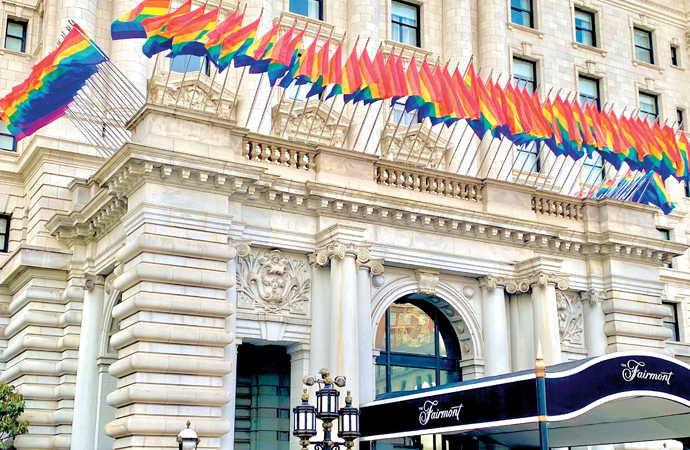
Fairmont San Francisco / Photo: Courtesy of Fairmont San Francisco
There appear to be more hotel-sponsored drag shows and drag brunches this Pride Month than ever, from the Fairmont San Francisco and the Thompson San Antonio Riverwalk to the Condado Ocean Club in San Juan, Puerto Rico. This is perhaps in response to the controversy that has surrounded the performance-art form in several conservative states this year. Even the Montage Palmetto Bluff in South Carolina is offering Pride Month programming, including sponsoring the Lowcountry Community Pride 5K race—where guests are invited “to run, walk, skip or sashay through Bluffton”—and signature cocktails offered throughout June with proceeds supporting The Trevor Project.
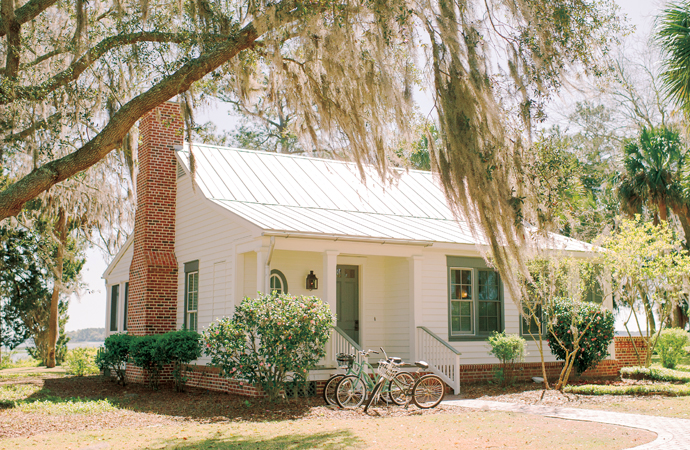
Montage Palmetto Bluff in Bluffton, South Carolina, which offers Pride Month programming / Photo: Courtesy of Montage Palmetto Bluff
Look around and you’ll see that there is no right or wrong way for businesses to get involved with Pride—every effort conveys an intention of welcome and celebration. Even the smallest changes can have a significant impact, and inspire travelers and travel professionals alike to think differently about what inclusive travel could and should mean. This fall, for example, United Airlines will roll out new name tags for all customer-facing teams that include personalized features such as milestone anniversaries and—for the first time—the option to add preferred pronouns.
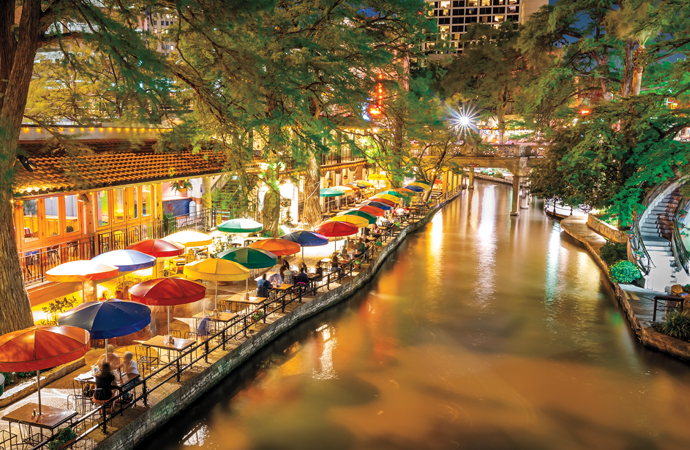
Riverwalk in San Antonio / Photo: Manjurul/iStock/Getty Images
“With this update, we’re welcoming staff to be themselves and identify in the way that feels most true to who they are,” says spokesperson David Gonzalez. It’s a small change, but a significant one, pointing toward a world where LGBTQ travelers are treated not as a specialty market but as a community that is just as important—and as much a part of society—as everybody else.


